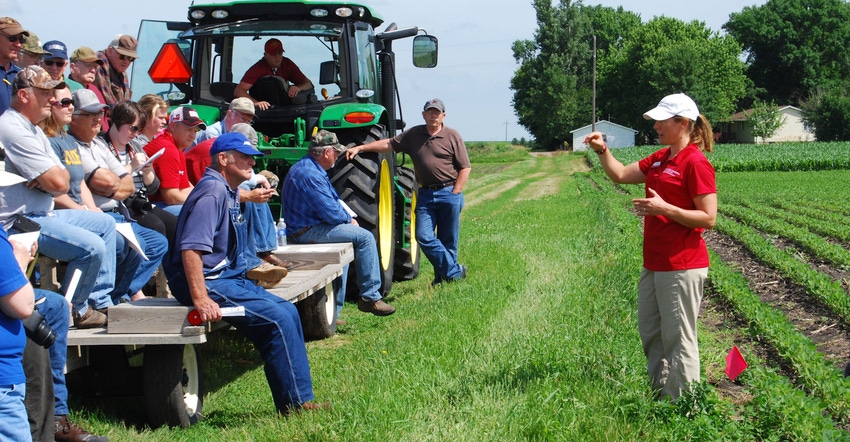October 20, 2017

A broad coalition of 63 organizations involved in almost every facet of U.S. agriculture is asking Congress to double USDA’s research, education and extension budget. The coalition is submitting a letter today to U.S. House and Senate agriculture leaders asking for $6 billion in funding for these programs during the five-year life of the 2018 Farm Bill.
Dr. Wendy Wintersteen, Endowed Dean of Iowa State University of College Agriculture and Life Sciences, has been involved in national discussions, organized by the Supporters of Agricultural Research (SoAR), on strengthening the research title of the new Farm Bill. She says bit by bit, SoAR has been reaching out to food, ag and natural resources organizations and advocacy groups asking them to come together with a common request for greater federal research funding.
Unified approach to meet the challenges facing agriculture
“Knowing that a rising tide can lift all boats, a common call for increased federal research funding so we can meet the challenges of a growing world population on a shrinking planet, may finally bring some relief to the pressures facing society, including the agricultural community,” says Wintersteen.
Richard Wilkins, a Delaware farmer and chair of the American Soybean Association, is also involved in the coalition. “Modern agriculture is a science-based business,” he notes. “And yet, we as a nation are not investing enough in publicly funded research while China has doubled its commitments. We need to regain and maintain our nation’s place as the international leader.”
The coalition’s letter to Congress outlines 10 specific policy recommendations, including funding recommendations aimed at new investments in public food and ag research and extension. It also presents policy recommendations focused on improving the coordination, oversight, efficiency, competitiveness, and responsiveness of our nation’s public agricultural research, education and extension system.
Broad agreement on need to boost federal ag research
“The need to drastically improve the federal agricultural research budget has created a consensus far broader than anyone thought possible,” says Michael Heller, a Maryland livestock producer, founder of the Maryland Grazers Network, and a member of the National Sustainable Agriculture Coalition. “Based on my long involvement with sustainable agriculture research and in helping to train the next generation of American farmers, I know firsthand how important it is for the next farm bill to boost funding for research title programs to help get the USDA research budget off its current plateau and climbing again, quickly.”
The coalition letter notes that agriculture is “a pillar of the U.S. Economy, accounting for nearly $1 trillion of our GDP, 1 in 10 jobs, and a significant contribution to our nation’s trade balance.” And yet, the U.S. investment in this sector has tailed off considerably. “By 2013, China’s spending on public agricultural R&D became nearly double that of the U.S. Though public funding for other forms of domestic research has risen dramatically, the U.S. agricultural research budget has declined in real dollars since 2003.”
Ag research underfunded, neglected for too long
“As a nation, we have underfunded agricultural research and neglected a vitally important area of science far too long,” says ISU’s Wintersteen. “But we can turn this around by increasing support for the researchers who are discovering the innovations that ultimately improve and protect consumers’ lives, sustain our natural resources, and strengthen agriculture’s contribution to the national economy.”
The consensus building process leading to these recommendations found the ag community keenly aware of the pressing challenges society faces as agricultural productivity needs to increase dramatically, but in ways consistent with economic opportunity, consumer preferences, and protecting the environment. The funding and policy recommendations reflect this grand challenge.
“We need to find solutions to meet the food demands of a growing population," says Dr. Ellen Bergfeld, CEO of the American Society of Agronomy, Crop Science Society of America, and the Soil Science Society of America. "Our scientists are developing resilient crops and improving the soil. They develop and apply the best management practices to grow food sustainably. All of these topics are top research priorities that need a larger federal investment. Agronomists and crop and soil scientists have continued to find evidence-based solutions to improve food growing capacity; future food solutions depend on future funding."
Federally funded ag research supports national security
“Increasing federally funded ag research is, at its core, a national security priority,” says Thomas Grumbly, president of the Supporters of Agricultural Research (SoAR) Foundation. “When the food supply is disrupted anywhere around the globe, the shockwaves always find their way to trouble us. The U.S. once led the world in solving the threats faced by farmers and food producers everywhere—we need to reclaim that title. Congressional enactment of these recommendations will benefit our nation today and for generations to come.”
Representing the 63 organizations submitting the letter to Congressional leaders are the following five:
American Soybean Association: ASA represents all U.S. soybean farmers on domestic and international policy issues important to the soybean industry. ASA has 26 affiliated state associations representing 30 soybean producing states and more than 300,000 soybean farmers.
National Sustainable Agriculture Coalition: NSAC is an alliance of over 100 farmer and community-based grassroots organizations that advocates for federal policy reform to advance the sustainability of agriculture, food systems, natural resources and rural communities. For more information, visit sustainableagriculture.net.
Iowa State University: ISU’s College of Agriculture & Life Sciences is one of the world’s premier institutions for ag education, research, extension and outreach. ISU’s 26 undergraduate majors in ag and life sciences prepare students to be science-grounded leaders in addressing society’s challenges. ISU’s Ag Experiment Station is the state of Iowa’s only public agricultural research program. It has served Iowa for nearly 130 years. Its diverse portfolio represents people and programs working for the good of Iowa and the world, and the betterment of agriculture. ISU’s agricultural researchers and extension staff work across the state to help Iowans more efficiently and sustainably produce food, energy and everyday materials; protect plant, animal and human health; and care for the environment. For information, visit cals.iastate.edu.
Agronomy, Crop and Soil Science Societies: The American Society of Agronomy (ASA), Crop Science Society of America (CSSA) and Soil Science Society of America (SSSA) are leading international scientific societies which help their 12,000-plus members advance the disciplines of agronomy, crop science and soil science. ASA, CSSA and SSSA foster the transfer of knowledge through research-based publications, educational programs, certifications and science policy initiatives. For more information visit agronomy.org, crops.org and soils.org.
Supporters of Agricultural Research (SoAR) Foundation: SoAR leads a non-partisan coalition representing more than 6 million farming families, 100,000 scientists, hundreds of colleges and universities as well as consumers, veterinarians and others. SoAR educates stakeholders about the importance of food and ag research to feed America and the world and advocates for full funding of USDA’s Agriculture Food and Research Initiative (AFRI). SoAR supports increased federal investments to encourage top scientists to create agricultural solutions that improve public health, strengthen national security, and enhance U.S. economic competitiveness. For more information, visit supportagresearch.org.
About the Author(s)
You May Also Like






